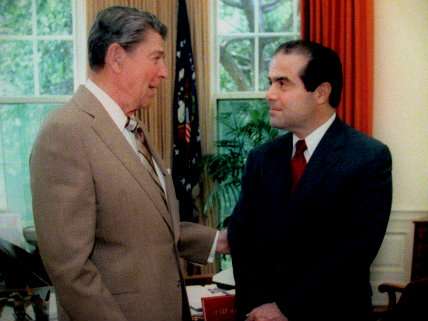Justice Scalia and the Libertarian Legal Movement
Libertarians disagreed with Scalia on many issues, but they also have to give him credit.

Was Antonin Scalia a libertarian? The question seems laughable, right? After all, it's Anthony Kennedy who's at the heart of the Supreme Court's libertarian moment (such as it is), not that arch-conservative who called the ruling striking down the Defense of Marriage Act "legalistic argle-bargle."
And in truth, one can presume that the first Italian-American justice's personal views are about as socially conservative as any modern public official. But so what? There are plenty of religious libertarians, and policy issues like abortion and the death penalty split the liberty movement.
Ah, but Scalia, who died yesterday at the age of 79, based his judicial opinions on those conservative views, right? Well, with the possible glaring exception of Gonzales v. Raich—the 2005 medicinal-marijuana case in which he went with the Drug War over federalism—it's hard to point to such corruption. (Democratic partisans also invoke Bush v. Gore, but that case is so sui generis that I've come to appreciate the Court's instruction that nobody should cite it for any legal point ever.) Raich is no small case—it pushed the scales from my eyes about Nino, as NFIB v. Sebelius did regarding John Roberts—but that's not bad for a 30-year career, especially given the flag-burning and criminal-procedure cases where surely his policy preferences lay elsewhere.
Indeed, Scalia based his entire revival of originalism and textualism on the idea that judges are bound by the written text and aren't free either to impose their own views or to divine some mythical legislative intent. As Jonathan Adler put it, before Scalia, "justices had no reluctance to join an opinion suggesting that statutory text could illuminate congressional intent where the legislative history was inconclusive."
The point isn't that Justice Scalia's jurisprudence was libertarian—Kennedy votes with the Cato Institute's position more and Clarence Thomas is a more faithful originalist—but that his commitment to the rule of law, and to bringing the Court back to a more principled jurisprudence, is in itself a libertarian victory. Without Scalia, the same kind of attention would not be paid to the Constitution's text, structure, and history—especially by so-called liberal originalists.
Nor, for that matter, would the Federalist Society, the fusionist group of conservative and libertarian lawyers, be quite the force it is today. Prof. Antonin Scalia was the first faculty adviser of the University of Chicago's (co-founding) chapter, and Judge and then Justice Scalia continued to be a strong supporter. (As have been Justices Thomas and Samuel Alito, but not Chief Justice Roberts.)
Much as libertarians have disagreed with him on cases regarding unenumerated rights, from Troxel v. Granville to Obergefell v. Hodges—even to McDonald v. Chicago, where at oral argument he disparaged the Privileges or Immunities Clause and instead joined an opinion based in his long-hated substantive due process—libertarian legal eagles have to give Scalia credit. After all, without Scalia's having made peace with the New Deal, who would Richard Epstein have to argue against about the Constitution's protections for economic liberty?
Scalia forced everyone to raise their intellectual rigor. I wasn't reading legal opinions before he joined the Court in 1986 (I was precocious in fifth grade, but not that precocious), but in retrospect it's easy to see a step-change from the early 1980s to the early 1990s. It's no coincidence that every law student now reads plenty of Scalia's writings—majority, concurrence, and dissent—because, agree with him or not in any particular case, he grasps the nettle.
So what now? On so many issues of individual liberty—from the right to participate freely in election campaigns (Citizens United) to the right to bear arms (Heller), from preventing the federal government from commandeering state officials (Printz) to stopping it from forcing people to violate their religious beliefs willy-nilly (Hobby Lobby)—replacing Scalia with even a "moderate" progressive would mean the end. And many close criminal-law cases align along principled-vs.-pragmatic lines, so a centrist would be worse there than someone in the mold of Ruth Bader Ginsburg.
It's been nearly 80 years since a justice was nominated and confirmed during a presidential-election year, and 100 years since such a confirmation had a recorded vote. (Louis Brandeis was so controversial that the Senate Judiciary Committee had its first-ever public hearing on a high-court nomination.) In a decade when Barack Obama has won two elections and the Republicans have won seemingly everything else, the Senate is fully justified in not taking up any nomination until after a new president is inaugurated.
That, perhaps, is Scalia's final gift to libertarians: watching both parties struggle not only with Trumpets and Sandernistas, but also with this incredible development in an already bizarre campaign. I can see Nino sitting down with St. Peter over some pizza and chianti and chuckling over the whole predicament.
"If you believe in democracy," he would say, "you put it to the people."
Ilya Shapiro is a senior fellow in constitutional studies at the Cato Institute and editor-in-chief of the Cato Supreme Court Review.


Show Comments (77)